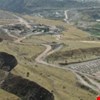
Unsustainable irrigation policies during the Soviet era have had devastating consequences for the Aral Sea. With the collapse of USSR, the riparian states took action and entered into agreement on Cooperation in the Joint Use and Protection of Water Resources of Interstate Significance. Furthermore, the international community took action and much attention has been devoted to re-establish the Aral Sea ecosystem. This case illustrates the importance of engaging all key stakeholders.

The first dam on the Lower Mekong River Mainstream, Xayaburi was notified to the Lower Mekong Countries in 2010. The public consultations took place in each country. The result favoured the construction to be postponed for 10 years to allow further study.

In Central Asia, water is unevenly distributed with states positioned downstream being placed in a very unfavourable position. The situation is further complicated since the benefits from cooperation are highly asymmetrical. Despite the challenge, the states have taken action and entered into a regional agreement, which attracted the international donor community to engage further. This case illustrates how international initiatives can influence institutional arrangements in transboundary basins.

With the collapse of the USSR, the water sector seized to be subsidised leading to deterioration of basic infrastructure. Action was taken to partially transfer the responsibility for operation and maintenance of irrigation systems to water users. Nonetheless, this has had limited success because it has been seen as an additional cost rather than benefit. This illustrates that for this to work, the returned benefits need to be higher than the costs.

The World Bank has conducted feasibility studies in order to offer input for the decision making process over the construction of the Rogun dam. This case study describes the impact of the World Bank feasibility report on the cooperation over transboundary water resources between Uzbekistan and Tajikistan.

Uzbekistan is experiencing water scarcity, an issue which will be exacerbated with increased demand. Although policies exist, the water seldom reaches the end water users. To combat this issue, action has been taken by GWP Uzbekistan to conduct trainings and workshops on the dissemination of IWRM to encourage a participatory multi-sector approach. This case study illustrates the importance of public awareness, and the need for work to be conducted at all levels.

Half of the land area of Tien Giang Province in Vietnam is exposed to annual floods and the other half to saline intrusion. Action was taken to formulate the National RWSS Strategy and efforts were made to make local communities aware of methods and approaches in harvesting water and well drilling that are cost effective and sustainable in their development. The key lesson is the value of appropriate planning prior to any project.

Water Supply and Sanitation policy in Vietnam is regulated through policy and a regulatory framework. However, the rural sanitation sector have had limited success and management has failed to be scaled up. To address these issues the Problem-Driven Governance and Political Economy Analysis Good Practice Framework was used to analyse the poor performance. The most important lesson is that not all policies are appropriate for scaling up.